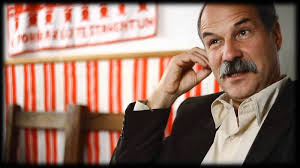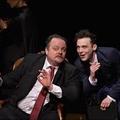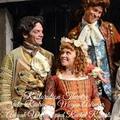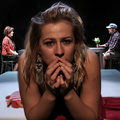Artist Interview: András Berecz
In simple terms, András Berecz is a raconteur, a singer and master storyteller, but his art form defies categorization. As a performer, he is highly in demand; yet, as he explained in the course of our conversation, he never dreamed of a stage career. After a performance of his new show Sinka ének at the National, he kindly consented to be my first interview subject for the Budapest Theatre Digest blog.*
* [Our interview was conducted in Hungarian. I hereby take full responsibility for any mistranslation or misrepresentation. – Patrick Mullowney]
P.M. : How would you describe yourself as an artist? What is your genre?
A.B. : The only reason I can answer this question is that so many people have asked me, I was forced to come up with a reply. Personally, I would say nothing; but when asked, I say I’m a singer-storyteller.
P.M. : Do you consider yourself an anthropologist?
A.B.: It’s not a bad comparison. I rather think of myself as a curious fellow, and no one places any limits on me. Mainly, I’m interested in people, how they behave in a collective (and not as individuals), so I concentrate on their traditions. That said, it’s the innovations on tradition that are interesting – when people aren’t slaves to tradition, when they create freely within the tradition. That’s the most exciting.
P.M. : Do you go to the countryside to track down songs and stories for material?
A.B. : Yes, I go into the countryside and collect material. The elders say we have two ears and one tongue. If you cannot listen twice as much as you speak, you shouldn’t open your mouth. The best part of my craft is the listening.
P.M.: Are you a trained singer?
A.B.: No. Well, in a way, yes. I studied in villages with mud roads beyond where the buses run. I learned in nameless little places from nameless old men and women.
P.M. : How could you establish a relationship with them?
A.B. : Well, for example, in Transylvania, in poor places, I can make a friend within 12 minutes. They give me shelter. They don’t want me to leave. “Stay,” they say. I’ll tell you a quick story. It was the Ceauşescu era. I was on the train, and there was this smell of sour milk, because the people there were farmers. They milked their own livestock. There was also cigar smoke in the air and one dull lamp burning in the whole car. Everyone was looking at me, because they all knew each other, but no one knew me. Then, some guy comes up and asks, “Where are you going?” So I tell him the name of the village. “Where will you sleep?” he asks. “I don’t know.” “You’ll stay with me,” he says. Now when I meet sources, it’s usually through a friend who says I should talk to someone. I bring a gift, like a bottle of wine.
P.M.: I want to speak a little more about your singing style. I notice you almost always sing with one hand to your ear. Is that to stay on pitch?
A.B. : Sometimes I sing with 2 violins, a three-string and a four-string cello, bass, and cimbalom. When they all play together and there’s no mic, I can’t hear my own voice otherwise. Now it’s so ingrained, I do it even without an orchestra.
P.M. : And the special tricks that you do with your voice when you sing – I’m thinking about the slides and clicks – is that your own interpretation, or are you imitating a specific source, perhaps the original singer you heard it from?
A.B. : Like I said before, I learned from the elders. What made an impression on me, I try to give back – not because I learned it; it simply stuck. In the beginning, I didn’t record them. Later, I made recordings, and I would listen to them constantly until the cassettes wore out. Now I have an extensive collection on my computer, and I can listen to them on trains or buses or whenever I get the chance.
P.M. : So, in summary, it’s not an imitation. It’s just the style you picked up.
A.B. : That’s correct. It’s instinct.
P.M. : So let’s talk about your new show Sinka ének. It’s devoted to the poetry of István Sinka. Why Sinka? How did you encounter his work?
A.B. : Well, I’ve dealt a lot with herdsman singers. They really interest me, because they’re freestylers – far freer and less inhibited than the villagers, since they’re out in the open all day. As a university student, I heard about István Sinka during some literature lecture, and I looked him up. He is considered the best writer of Hungarian ballads next to János Arany, but while János Arany went to the library for inspiration, Sinka drew from the lives of people around him. Not legends, everyday people’s fates. And he was born about 100 meters from János Arany, in the village of Nagyszalonta, practically on the same street. He writes in the ballad form, so six to eight syllables per line. It simply demanded to be set to folk music, and I was the man to do it. I used the herdsmen’s songs collected by Zoltán Kodály, folk songs from the Bihar County, as base material.
P.M. : Why did he make such an impression on you?
A.B. : Because the impossible happened to him. How could he go from the depths of poverty to become a recognized poet? As a boy, he was beaten if he was caught reading. Because he was born into a family of herdsmen, and what was the use of reading? Do you know how he got to Budapest? He nearly starved to death. He left behind three orphans, because his wife had died, and he came to the city with the 3-cm stub of a yellow pencil and all the poems in his head. He would sleep in the bushes of Népliget [People’s Park] and Gellért Hill. In cold weather, he would squat near the sculleries on Váci Steet and sleep in the steam rising out of the grill.
P.M: : Is that what interests you about him?
A.B. : Among other things. He’s a herdsman, and I know them well. And his flawless use of Hungarian. City-dwellers have no ear for the language.
P.M. : This is different from your stand-up comedy shows at Dumaszínház. What was your concept for Sinka ének?
A.B. : The audience determines the form. With stand-up, they’ve come to laugh, so I tickle their feet and scratch their ears a little. With Sinka, I’m at the service of the late poet. I want to portray his world and worldview. That’s why there’s dancing. That way, I could depict him in more dimensions. The herdsmen were good dancers.
P.M. : What do you want to give the audience?
A.B. : It’s difficult to express in general terms, but I’ll try. I don’t like it when the intentions are so clear. There are some who dedicate their careers to their love for the language – say, teachers and educators – but their message is very obvious; it’s didactic. When an audience sees me onstage, they understand the game, but I’m like a jester who’s just amusing himself, uninhibited, playing with words for his own pleasure. So my aims are not apparent.
P.M. : Fine, but what is it you want to give to the audience?
A.B. : For example, forgotten Hungarian words. It’s a joy for them to hear these expressions – like old friends they have never met before. Forgotten songs, singing styles, turns of phrase, grammar constructions. That’s one of the pleasures for me.
P.M. : For those who are unfamiliar with you, where all do you perform?
A.B: : Bars, universities, nursery schools, churches. From Vancouver to Uzbekistan, from Stockholm to Cairo. In two weeks, I’ll go to New York and Boston.
P.M. : Do the local Hungarians invite you?
A.B. : For the most part, but the Estonians invited me. I perform with an interpreter in a Middle-Age castle not far from the sea.
P.M. : As we discussed before the interview, the text of Sinka ének is very hard for non-native speakers to understand. Do you have another show that you would recommend to interested foreigners?
A.B. : I’ve done programs for foreigners, too. But I always improvise depending on the room. There are two types of storytellers: the ones who recite the material like Holy Scripture and those who recreate it on the spur of the moment. Honestly, I only announce a program beforehand to appease the organizers.
P.M. : But if expats would like to check out one of your shows, what’s your advice?
A.B. : Without an interpreter, they’ll be disappointed. On such occasions, I recommend the shows with plenty of music.
P.M. : Let’s talk a little about the theatre scene. You’re the only artist in this folklore genre who regularly performs at the National Theatre of Budapest. How did you get this opportunity from the general director, Attila Vidnyánszky? How did it come about?
A.B. : Originally, I performed at community centers and libraries, venues like that. My first appearance on a real stage was at the Bárka [former theater on Üllői út – P.M.]. The actors told me there was a place for me in the theatre. After a long period of time, Vidnyánszky contacted me about The Passion of Christ from Csíksomlyó. I didn’t want to do it. “I’m not an actor,” I said, “I can’t submit to direction. But if I can appear as András Berecz, I’ll do it.” He said, “That’s exactly what I want.”
P.M. : As far as I know, you appeared at the National Theatre before that.
A.B. : You’re right. I had been on the program for three seasons by then.
P.M. : I know you’ve worked with your sons before – for example, at the Vígadó. However, in Sinka ének, you didn’t work with Mihály (pianist) or István (dancer), but with other artists, and your third son Marci sang with you on one number. How did this arrangement come about?
A.B. : Ad hoc. István cut his hand very deeply, so he couldn’t do it. I originally wanted three dancers. Another one, Zoli [Zoltán Zsuráfszky], had a previous engagement. That meant Jani [János Apeshoffer] was the only one left. Marci sings really well, and he knows the material, so I just invited him along.
P.M. : But not for every show.
A.B. : No, just occasionally.
P.M. : And how do you answer the critics who say that folklore artists are merely artificial peasants [műparsztok]?
A.B. : I don’t get upset about it. Some call me műparaszt just on account of my moustache. Usually, they are guys from Budapest who don’t really know my work. We’ve seen a hell of a lot of fake peasants on the operetta stage, but that’s already really boring. One critic called me műparaszt, but then he also said that it’s worth listening when I open my mouth. I took that as a great compliment.
P.M. : In my blog, I criticized A medve nem játék! [Bears Are No Joke!] at the Turay Ida Színház for being full of stereotypes, and you’re listed on the program as an advisor.
A.B. : Really?! I told them I didn’t want my name connected to that show.
P.M. : What is your strategy for avoiding stereotypes in your own work?
A.B. : I have no strategy, I just have a sense for this. I can smell it if something is flat, cliché, empty, weak. That performance is built on jokes, which is far from my genre.
P.M. : But at Dumaszínház, you do stand-up comedy.
A.B. : I rarely build performances on jokes. If I’m funny, it’s not because I tell jokes. That’s a different genre. I have to travel a lot and absorb a lot in order to do what I do.
P.M. : So, to put it in perspective, you have a very full schedule nowadays. You travel and perform constantly. Have you achieved your goals? Was this the career that you dreamed of?
A.B. : To be completely honest, theatre is a fairly new development in my life. I’ve been exposed to this folklore since I was a child – first from my parents, who both came from the countryside. I began collecting material in 1979. My first trip was to visit a Csangó community in Moldva [now part of Romania, not Moldova - P.M.]. The first time I sang songs in public was as a soldier. I was sent to the barracks in Kalocsa for military service. One time on leave, I went out to the open-air stage and sang between the folk dance numbers. I had no idea I would be performing at 60 years of age. Really, I never planned on it.
A bejegyzés trackback címe:
Kommentek:
A hozzászólások a vonatkozó jogszabályok értelmében felhasználói tartalomnak minősülnek, értük a szolgáltatás technikai üzemeltetője semmilyen felelősséget nem vállal, azokat nem ellenőrzi. Kifogás esetén forduljon a blog szerkesztőjéhez. Részletek a Felhasználási feltételekben és az adatvédelmi tájékoztatóban.





